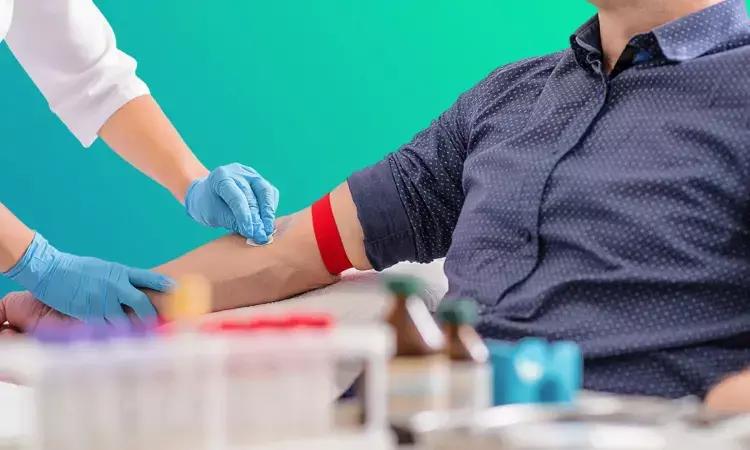Lipid Accumulation Product Index Predicts New-Onset Type 2 Diabetes In Non-Obese People
- byDoctor News Daily Team
- 08 July, 2025
- 0 Comments
- 0 Mins

South Korea: A high lipid accumulation product (LAP) index can indicate type 2 diabetes mellitus (T2DM) in middle-aged and elderly Koreans who are non-obese, results from a 2-year longitudinal study have shown.
The research, published in Dove Press' Diabetes, Metabolic Syndrome and Obesity: Targets and Therapy, found that a higher LAP index is independently and positively linked with type 2 diabetes after adjustments for known confounding variables within the large-scale 12-year follow-up data.
LAP index has gained attention for reflecting metabolic alterations linked with lipid accumulation status. Lipid accumulation product is a product of waist circumference and triglyceride and is derived to reflect the anthropometric and physiological status of an individual. Initially, its measurement was done to reflect cardiovascular disease (CVD) risk in a general sense. However, it gained further attention due to its links to chronic kidney disease, insulin resistance, and liver disease.
Korean ethnicity is said to be lower in anthropomorphic statistics than the general population. According to the Korea National Health and Nutrition Examination Survey, the LAP index may represent beta-cell function and insulin resistance even in non-diabetic people. The previous study on other Asian populations revealed that the LAP index demonstrated better predictive value for metabolic syndrome than waist circumference (WC) or body mass index (BMI).
Against the above background, Seung Ho Yang and the research team from South Korea aimed to determine the longitudinal association between the LAP index and incident type 2 diabetes among non-obese Korean adults. For this purpose, they used a large, community-based Korean cohort observed over 12 years.
The study included 4281 non-diabetic adults who were non-obese and aged 40– 69 years from the Korean Genome and Epidemiology Study. The participants were categorised into four groups according to LAP index quartiles; this was calculated in men as (waist circumference [cm] - 65) x (triglycerides [mmol/L]) and in women as (waist circumference [cm] - 58) x (triglycerides [mmol/L]).
The key findings of the study were as follows:
14.2% of participants developed type 2 diabetes during the follow-up period.
HRs for incident type 2 diabetes in the second, third, and fourth LAP quartile was 1.32, 1.51, and 2.14, respectively, after adjustments for sex, age, body mass index, alcohol intake, mean arterial blood pressure, smoking status, impaired glucose tolerance, physical activity, and family history of diabetes.
"The findings suggest that a high LAP index can be an additional indicator for new-onset type 2 diabetes among middle-aged and elderly non-obese Koreans," the researchers wrote.
Reference:
Yang SH, Yoon J, Lee YJ, Park B, Jung DH. Lipid Accumulation Product Index Predicts New-Onset Type 2 Diabetes Among Non-Obese Koreans: A 12-Year Longitudinal Study. Diabetes Metab Syndr Obes. 2022;15:3729-3737
https://doi.org/10.2147/DMSO.S389889
Disclaimer: This website is designed for healthcare professionals and serves solely for informational purposes.
The content provided should not be interpreted as medical advice, diagnosis, treatment recommendations, prescriptions, or endorsements of specific medical practices. It is not a replacement for professional medical consultation or the expertise of a licensed healthcare provider.
Given the ever-evolving nature of medical science, we strive to keep our information accurate and up to date. However, we do not guarantee the completeness or accuracy of the content.
If you come across any inconsistencies, please reach out to us at
admin@doctornewsdaily.com.
We do not support or endorse medical opinions, treatments, or recommendations that contradict the advice of qualified healthcare professionals.
By using this website, you agree to our
Terms of Use,
Privacy Policy, and
Advertisement Policy.
For further details, please review our
Full Disclaimer.
Recent News
Scientists successfully reverse anxiety by restori...
- 07 November, 2025
Nanotechnology boosts cancer drug potency 20,000-f...
- 07 November, 2025
Smart hydrogel mimics skin repair to accelerate di...
- 07 November, 2025
Daily Newsletter
Get all the top stories from Blogs to keep track.


0 Comments
Post a comment
No comments yet. Be the first to comment!